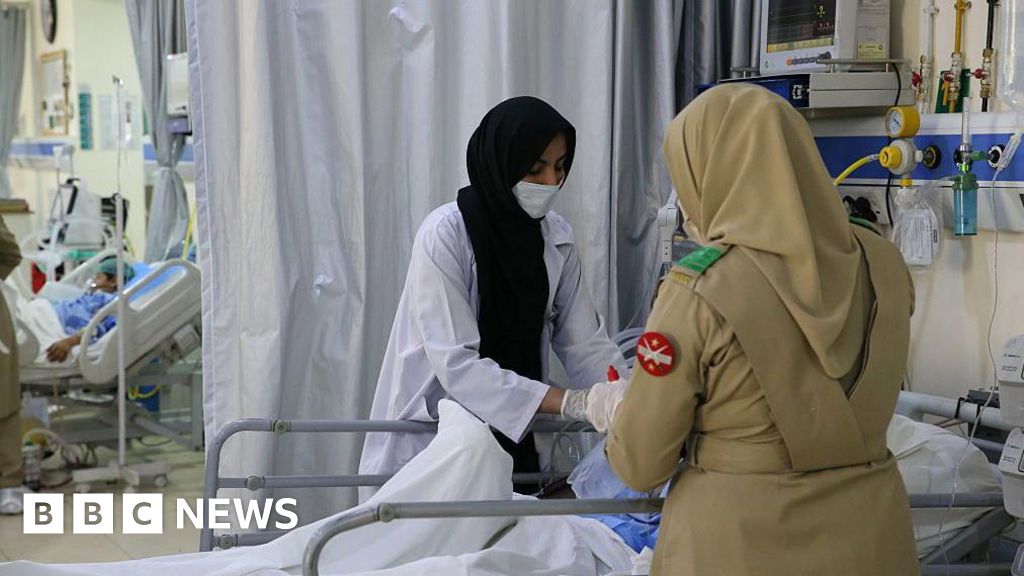Pakistan Correspondent
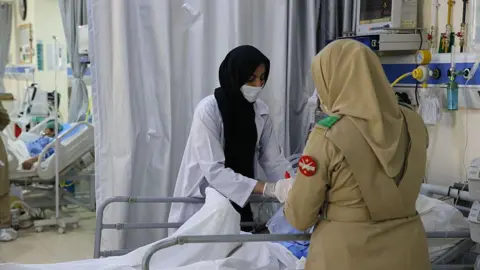 Anadolu via Getty Images
Anadolu via Getty Images“When I heard the attack happened, the ground fell from beneath my feet. All the parents started running towards the bus, no-one could understand what was going on,” Nasir Mehmood, a sergeant in Pakistan’s army tells us.
Nasir and I are in the city of Quetta, sitting in the waiting room of the largest military hospital in the province of Balochistan. His 14-year-old son Mohammad Ahmad told him he was flung across the army school bus in a bombing in Khuzdar, a few hours’ drive away.
The bus was carrying around 40 schoolchildren when it exploded at about 07:40 local time (02:40 GMT) on Wednesday.
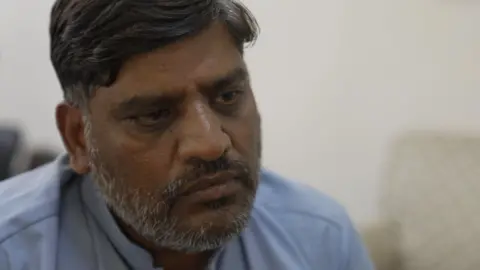
“I reached the hospital, and there were screams of children everywhere, it was the only thing you could hear,” Nasir said. “My eyes just kept searching for my son.”
Only the most serious cases were airlifted to the Combined Military Hospital. The military have said the death toll has now risen to eight, with six children killed and dozens injured. No group has admitted carrying out the attack.
It is rare for foreign journalists to be allowed to enter the province, south-west of Pakistan, let alone a hospital on the army’s compound. The military said they wanted international media to witness the impact of the attack themselves.
Pakistan alleges India is linked to the attack, though there is no independent evidence – and it is a claim Delhi firmly denies.
India and Pakistan are in the midst of a fragile ceasefire, after a two-week conflict that was their most significant one in decades. It saw them exchange drone attacks, missiles and artillery fire, and left dozens of casualties.
This attack in Balochistan is now in the middle of the tensions, with news channels broadcasting pictures of the children who were killed, most of them girls between the ages of 12 and 16, alongside accusations of an “Indian terror campaign”. Images of scrapped metal, children’s shoes and abandoned backpacks strewn along the scene highlight the tragedy.
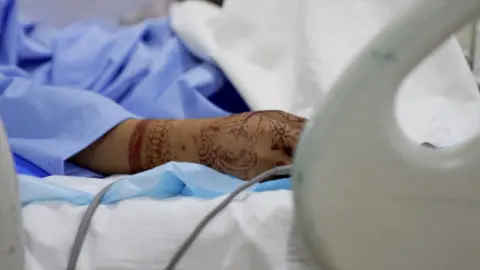
As we walked through the intensive care unit, some children lay unconscious on their beds, others thrashed in pain. One young girl kept calling out for her mother as nurses tried to calm her. Doctors told us several children were in critical condition, having suffered extensive trauma, burns and fractured bones. The night before we arrived, another child had died.
Pakistan’s Minister of Information, Attaullah Tarar, says there is a history of Indian proxies operating in Balochistan. In turn, India says that Pakistan has been harbouring militants who wage attacks on Indian-administered Kashmir for years.
The killing of 26 people in April, most of them tourists in Pahalgam, sparked the most recent conflict. Pakistan has called for an open investigation led by an independent party.
However, Tarar denied that such an investigation was necessary in Balochistan.
“Pahalgam was a one-off incident,” he told us. “We are the victims in this case. We have been suffering. There is a history. We have evidence. So what can I say?”
When we asked him what that evidence was, he once again pointed to claims of a history of attacks. He gave us no other details of India’s alleged involvement in this attack.
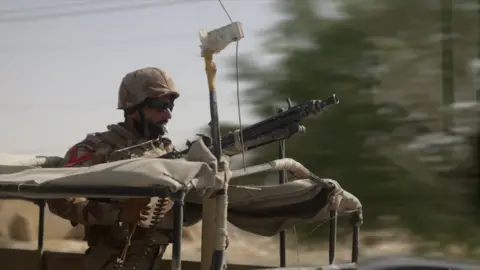
A turbulent province
Later, an officer drove us through Quetta’s roads in a bus flanked by soldiers carrying rifles and ammunition hanging from their pockets.
Balochistan has experienced decades of militant attacks linked to a nationalist insurgency. It is home to several groups which accuse the government of exploiting its natural resources.
In March, some 21 people, most of them off-duty security personnel, were killed during a train siege in Balochistan’s remote Sibi district.
That attack was carried out by the Balochistan Liberation Army (BLA).
Pakistan, as well as several Western countries, including the UK and US, have designated the BLA as a terrorist organisation.
As the military responds to the insurgency, activists in Balochistan accuse Pakistan’s security forces of human rights violations. They say thousands of ethnic Baloch people have been disappeared in the last two decades, and are allegedly detained without due legal process.
The minister of information told us the government believed “faceless courts” might be needed in the province, hiding the identities of the judges and prosecutors in terror cases. Tarar said the courts often fail to convict the accused, because of a fear of retribution from militant groups.
In a press conference, the military spokesperson, Lt Gen Chaudhry, said the school bus attack “had nothing to do with the Baloch identity, rather it was just India’s provocation”.
The government says it is raising the issue “across diplomatic channels” around the world.
The impact on the ceasefire and on the prospect of talks between India and Pakistan remains to be seen.
Additional reporting by Malik Mudassir
Source link
